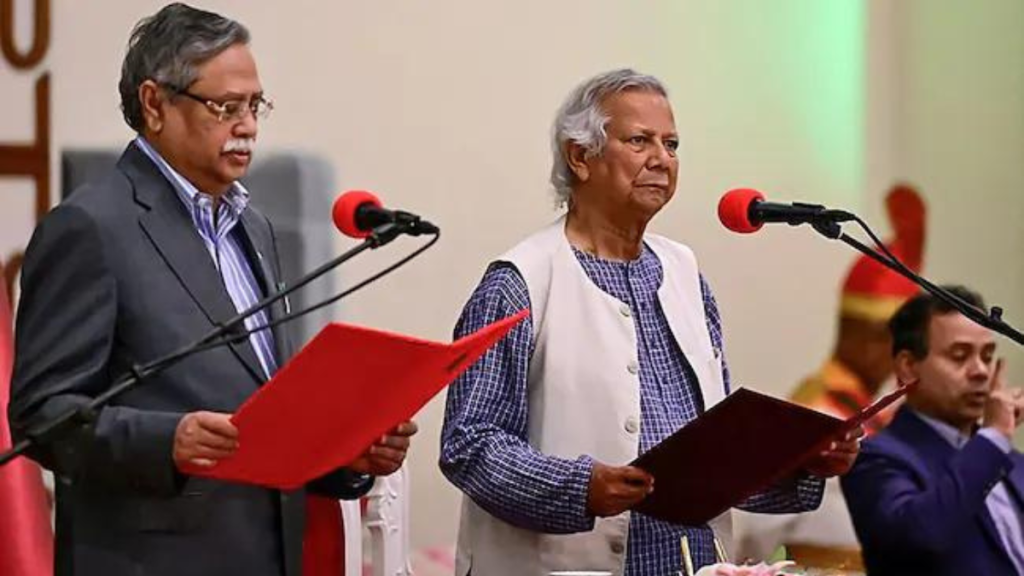On August 8, 2024, Bangladesh witnessed a pivotal moment as Nobel laureate Dr. Muhammad Yunus was sworn in as the interim Prime Minister, following the resignation of Sheikh Hasina. This significant event comes after months of unrest driven by a student-led movement that challenged the long-standing rule of Hasina’s government. The appointment of Yunus, known globally as the founder of Grameen Bank and the “banker to the poor,” marks a new chapter in Bangladesh’s political history.
Background: A Country in Turmoil
Bangladesh has been on edge for several months, with widespread protests erupting across the nation. The catalyst for this unrest was a growing dissatisfaction among students and young citizens, who accused Sheikh Hasina’s government of corruption, discrimination, and economic mismanagement. The movement gained momentum, leading to violent confrontations between protestors and security forces. With the situation escalating, the military, opposition parties, and student leaders came together to seek a solution that would prevent further chaos and potential military rule. Their consensus was to bring in a respected figure who could unite the nation during this transitional period—Dr Muhammad Yunus.
Who is Muhammad Yunus?
Born in 1940 in the village of Bathua in the Bengal Presidency, he has long been a prominent figure in Bangladesh and around the world. His early life was marked by academic excellence, leading him to study economics at Dhaka University, where he earned his bachelor’s and master’s degrees. His academic journey continued in the United States, where he received a Fulbright scholarship and eventually earned a Ph.D. in economic development from Vanderbilt University.
He returned to Bangladesh in the early 1970s, just as the country was emerging from its war of independence. Deeply affected by the widespread poverty and famine he witnessed; Yunus dedicated himself to finding solutions to alleviate the suffering of the poor. His most significant contribution came in the form of microcredit—a revolutionary concept that provided small loans to impoverished individuals, particularly women, to start small businesses. This initiative led to the creation of Grameen Bank in 1983, which has since helped millions escape the cycle of poverty.
The Road to the Interim Government
His rise to the position of interim Prime Minister was unexpected but not surprising given his stature. Over the years, he has been a vocal advocate for social justice and economic reform, often clashing with the political establishment. His conflicts with Sheikh Hasina’s government are well-documented, particularly the controversies surrounding Grameen Bank in the early 2010s. Accusations of financial mismanagement and political meddling led to a strained relationship between Yunus and the ruling party, culminating in his forced resignation from the bank he founded. Despite these challenges, Yunus remained a respected figure, both domestically and internationally, which made him an ideal candidate to lead the interim government during this critical juncture.
Challenges Ahead
As interim Prime Minister, he faces a daunting task. Bangladesh is deeply divided, with tensions running high between various political factions, the military, and civil society. His primary challenge will be to restore stability and order in a country that has been rocked by protests and violence. Moreover, Yunus will need to address the concerns of the international community, which is closely monitoring the situation, fearing the possibility of military rule or further human rights abuses.
He has already pledged to form a government that prioritizes the safety and well-being of all citizens. In his first public address after taking office, he emphasized the need for unity and peace, calling on the youth who spearheaded the protest movement to channel their energy into rebuilding the nation. “We have got independence for the second time. We must protect this,” he declared, underscoring the significance of this transitional period.
The Role of the Military and Opposition
The role of the military in this transition cannot be understated. General Waker-Uz-Zaman, the Army Chief, played a crucial role in facilitating the agreement that led to Yunus’s appointment. The military’s support is vital for Yunus, as it ensures that the transition remains peaceful and that law and order are maintained. However, there is a delicate balance to be struck to avoid the military exerting too much influence over the interim government.
Additionally, the Bangladesh Nationalist Party (BNP), led by Khaleda Zia, has expressed its support for Yunus. Zia, who was recently released from house arrest, echoed Yunus’s call for peace and stability, urging the nation to move forward without anger or revenge. This cooperation between political rivals is essential for the success of the interim government.
International Response and India’s Presence
The international community is closely watching Bangladesh’s political transition, with many concerned about the potential for instability. World leaders are hopeful that Yunus’s leadership will bring about a peaceful and democratic transition. During the swearing-in ceremony in Dhaka, the presence of diplomats from various countries underscored the global significance of this event. Notably, India, Bangladesh’s neighbour and one of its most important regional allies, was represented at the ceremony. The participation of Indian officials highlights the importance of maintaining strong bilateral relations during this period of change.
A New Chapter for Bangladesh
The coming months will be crucial for Bangladesh as it navigates this transition. His leadership offers a glimmer of hope for a peaceful and democratic future. However, the challenges are immense, and the path ahead is fraught with uncertainty. The world watches as Bangladesh embarks on this new journey, with the hope that Yunus’s vision of a just and prosperous nation will prevail.

